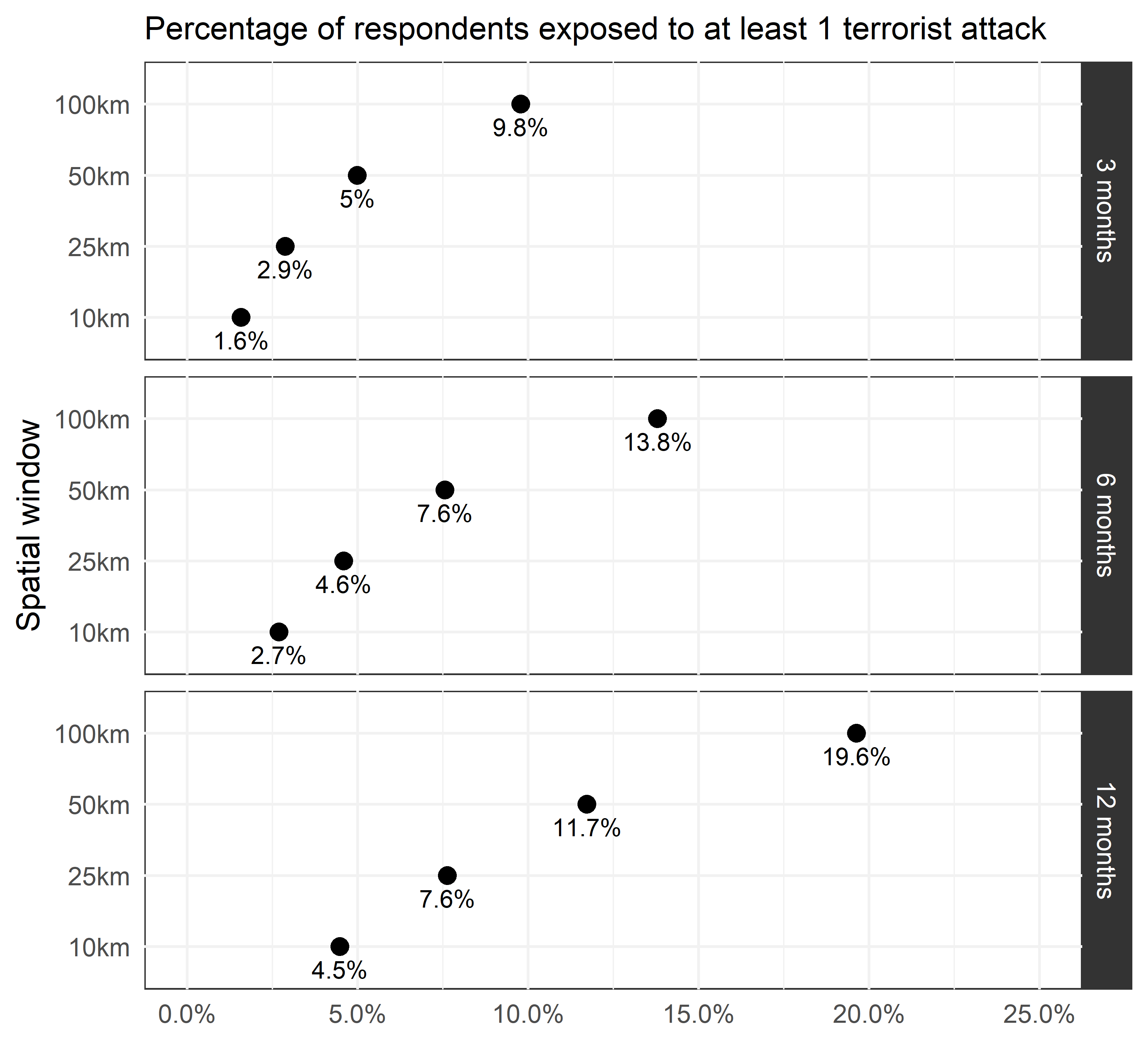Trey Billing
Data ScientistI am a Data Scientist at ACLED. My work spans multiple fields, with publications in political science using satellite imagery to measure development in Burkina Faso, in international relations using large-N statistical analysis across the world, and in popular outlets like USA Today. I have also designed and implemented original surveys, using experimental approaches that draw out hidden preferences and opinions of respondents. Prior to joining ACLED, I was a post-doctoral fellow with the Mershon Center for International Security Studies at the Ohio State University.
Education
- PhD, Government and Politics (2020) | University of Maryland, College Park
- MA, Government and Politics (2016) | University of Maryland, College Park
- BA, Economics (2013) | University of Dayton
Interests
- Conflict dynamics and recovery
- Computational social science and causal inference
- Political economy of development
Validating famine early warning systems network projections of food security in Africa, 2009–2020. Global Food Security (2021), with David Backer. [PDF]
Visualizing trends in food security across Africa, 2009–2020: Data and animations at a grid-cell level. Data in Brief (2021), with David Backer. [PDF]
Empirical studies of factors associated with child malnutrition: highlighting the evidence about climate and conflict shocks. Food Security (2020), with Molly E. Brown, David Backer, Peter White, Kathryn Grace, Shannon Doocy, and Paul Huth. [PDF]
Government Fragmentation, Administrative Capacity, and Public Goods: The Negative Consequences of Reform in Burkina Faso. Political Research Quarterly (2019). [PDF]
Conflicted Capital: The Effect of Civil Conflict on Patterns of BIT Signing. Journal of Conflict Resolution (2019), with Andrew D. Lugg. [PDF]
Click and expand for details
Citizen preferences for foreign aid in Uganda
Summary: Both the effectiveness and the politics of foreign aid depend on the citizens of recipient countries. Yet, existing work rarely consults these citizens directly. I argue that citizens likely have distinct preferences over key aid project dimensions and develop a conjoint-experimental approach to measure these preferences. Evidence drawn from around 1,300 respondents in Northern Uganda indicates that citizens strongly prefer social development to infrastructure projects and only slightly prefer certain donors, like the United States and World Bank, to others, like Japan and China. Contrary to existing perspectives, citizens care little about how much control their government has in an aid project, though citizens are particularly averse to their government even partially contributing to a project’s cost. The results of this experiment provide a unique glimpse into how intended beneficiaries view foreign aid. A paper summarizing these findings is currently under review.
The social and political consequences of terrorism in Africa
Summary: In this project with John McCauley, we match nearly 20 years of survey data in Africa to terrorist attacks in space and time. In a paper currently under review, we detail the negative effects of terrorism on perceptions for democracy. In another paper currently under construction, we show how exposure to terrorism effects religiosity in Africa.

Rebel targeting of aid during civil war
Summary: In this project with Mike Findley and David Backer, we present combine evidence from interviews with former commanders in the Lord’s Resistance Army (LRA), Ugandan government officials and military personnel, and an original survey of citizens to detail how, when, and why rebels target foreign aid during war.
FARC reintegration and pro-social outcomes in Colombia
Summary: Along with Chris Gelpi and Victoria Gurevich at Ohio State and Jose Fortou and Santiago Sosa at Universidad EAFIT in Colombia, I am designing survey and experimental instruments to assess an agricultural reintegration program for former FARC combatants in Antioquia, Colombia. This data collection effort will also explore perceptions and preferences among non-former combatants civilians and members of indigenous communities in the surrounding region.
Radio and the spread of violence during the Rwandan genocide
Summary: It is commonly accepted that radio played a significant role in the intensity and spread of violence during the Rwandan genocide. In this working project with Hollie Nyseth Brehm, Jared Edgerton, and Laura Frizzel, we subject this claim to complete data on gacaca trials in post-genocide Rwanda. Our results indicate that radio likely played a much less important causal role in the spread of violence than currently accepted.
Food security and conflict in Africa
Summary: I am a member of the MERIAM research team, primarily developing models to predict childhood undernutrition in response to conflict and climate shocks. In addition to predictive model development, I am also engaged in evaluating the accuracy of commonly-used famine early warning systems. With David Backer, an article documenting patterns of accuracy in early warning prediction has recently been published in Global Food Security.
Experience:
- As teaching associate at the McCourt School of Public Policy (Georgetown University):
- Introduction to Data Science for MPP students
- As teaching assistant at the University of Maryland, College Park:
- Politics of the Developing World
- Religion, Beliefs, and World Affairs
- International Negotiations
- As a workshop instructor:
- Causal Inference using Conjoint Analysis
- Introduction to Spatial Data and GIS
- Document Processing with LaTeX and knitr